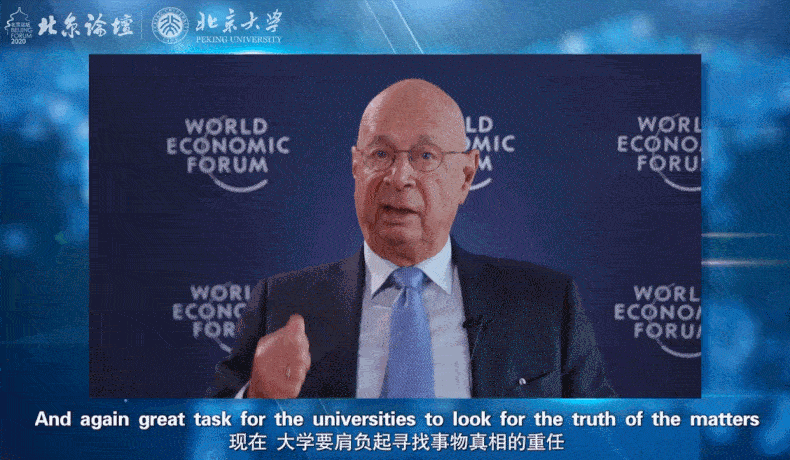Speech at Beijing Forum 2020
Klaus Schwab, founder and executive chairman of the World Economic Forum
Distinguished participants of the Beijing Forum,
Your theme this year, the harmony of civilizations and prosperity for all: new challenges and opportunities for globalization, resonate very deeply with myself. Let me share with you eight thoughts which are relevant in this respect, relevant for the world as a whole, and of course relevant for the work of the World Economic Forum.
First, we deeply believe in the power of the collaborative efforts of all stakeholders of global societies. Of course governments have a leading role, but if we want to address the global challenges, we need to engage business, civil society, the young generation, but we need to integrate, particularly universities, because universities should have new ideas, new concepts, and in such a way can substantially contribute to the progress of society.

Klaus Schwab
My second thought is related to take care and cultivate all our resources. It’s not just the physical capital, which is essential for our long-term wellbeing. No, we have to take care and we have to cultivate also our natural capital, our environmental capital, our human capital, and our social capital. So we need a new and lightened definition of what is called capitalism, integrating all those different factors. And we also have to be able to measure performance on the basis not only of physical and financial success, but also on the basis of what we contribute to the advancement of society and taking care of the planet.
My third consideration relates to the fact that we have to put much more emphasis on the long-term aspects, and not as we do now to a large extent, to the short term situation. Of course, the pandemic has forced us to think, if I may say so, just around the corner. But it is very essential, if we want to grow as a society, not just economically, we have to develop again, long-term perspectives. I’m very happy that China with its 14th five-year plan, has established lighthouses, which guide the Chinese people into the future.
Now the fourth consideration is that we have to make much more advantage of the technologies of the fourth industrial revolution. I’m thinking here of artificial intelligence; I’m thinking of the internet of things, of the new capabilities we have with genetic engineering, and I could go on and on. Those technologies have been very much advanced by the pandemic. We know that many of the world’s problems can only be solved if we apply new technologies, and I’m happy to see China putting high importance on developing its fourth industrial revolution capabilities.
My fifth consideration relates to our global togetherness. The pandemic has again shown us that we are interdependent. As President Xi has expressed in Davos in 2017, when he joined us at the annual meeting, we are all part of the same global humanity. So even if we have conflicts, even if we are sometimes competitors, but at the end, it’s our global togetherness, which should be the most important objective in whatever we do to maintain and to strengthen this global togetherness, and that’s what the World Economic Forum stands for.
My sixth consideration relates to the theme also of this Beijing Forum, which means building harmony. I’m very impressed by the Confucian notion of Hexie. I think we have to find again, an equilibrium in our world. We have to go away from the polarization, which we see now everywhere. And in order to do so, I think the most important building stones are truth and trust. And again, great task for the universities to look for the truth of the matters. And only if we have an organization that the nation and the global world, which is built on the truth, we can really establish and re-establish trust again.
My seventh point is that we have to believe in the principle of human beings being virtuous, being benevolent, because only if we rely on this positive nature of humankind, we can mobilize all the energy which we need to construct a positive future. Again here, there is a Chinese word which characterizes this philosophy, and I think it’s calledJunzi.
My last point is that we have now a window of opportunity. We are coming out, thanks also to the leadership of China, in terms of fighting the pandemic, in terms of reinvigorating its economy, we have now a window of opportunity to create this Global Reset which we all need. This Global Reset is necessary because we have seen that our policies, which we pursued before the coronavirus struck us, that those policies do not create the necessary inclusion of society necessary for harmonious societal development. And they do not create the sustainability of what we are doing. Just think of the global warming, how fast it is developing in the opposite into the negative direction. I’m very happy in this respect about the latest commitment of China of President Xi Jinping to be carbon neutral by 2060.
So we have a great opportunity at this moment like we had after World War II, to have in some way a new beginning in our global cooperation in globalization, in managing our global affairs. I hope that we will not miss this opportunity and I wish you all a very successful conference.